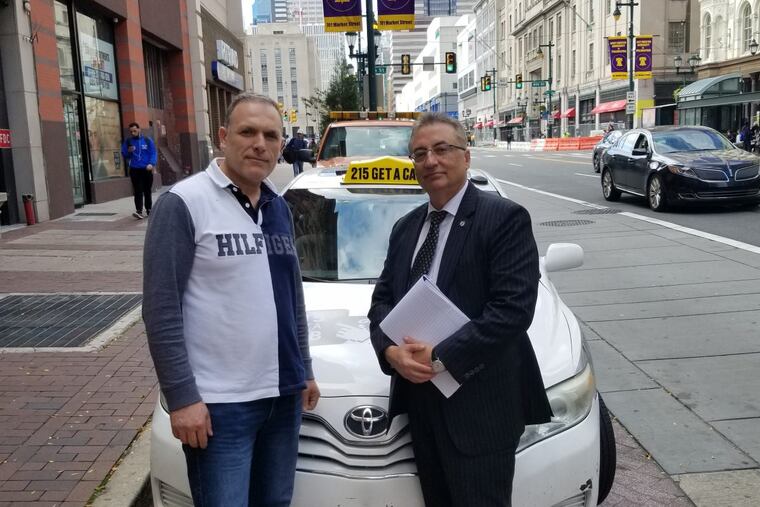Philly cabs finally take on Uber, Lyft with an app. It just took 3 years
Some 1,100 of the city's 1,600 cabs are joining forces for the first time to market themselves and use a common app.

Tap an app to get a ride. See where the driver is. Pay with your phone. Rate the driver.
Starting now and rolling out into January, several Philadelphia cab-dispatching companies have joined forces, combining technology and branding under the 215-GET-A-CAB name so that anyone who downloads the app can get the same type of service provided by Uber or Lyft — minus the surge pricing.
What took so long?
Insiders say it amounted to deer-in the-cab-lights syndrome: By the time Philly's stunned taxi industry recognized the threat from Uber and Lyft, it had already been run over, losing customers as their investments went from bounding to dead-end.
When UberX came into the market in 2014, "it was almost unfathomable to even think that a non-licensed provider" could operate in Philadelphia, said Everett Abitbol, owner of the Freedom cab-dispatching service. Freedom and PHL Taxi will combine their dispatching and management services with the region's biggest cab-dispatching and management company, 215-GET-A-CAB, owned by Alex Friedman and his family.
All together, the new app/dispatch service will summon about 1,100 of the city's 1,600 taxis — more than 700 from Friedman, 225 from Abitbol, and 160 from the Sterin family's enterprise, PHL Taxi.
Because government regulations for taxis amount to 400 pages, Abitbol said, no one imagined that any non-regulated enterprise would be allowed to operate. With cabs, "if you want to tie your shoes, you have to get permission," he said.
So when Uber and Lyft added thousands of vehicles to Philly's transit mix, Abitbol and other cab executives hoped, in vain, that the Philadelphia Parking Authority, which regulates city cabs, would boot those companies, which described themselves as ride-sharing services not subject to regulation.
The industry turned to Harrisburg, hoping for relief. Instead, Uber and Lyft were given the state's blessing to operate, although rules for the taxi companies were loosened "to level the playing field," Abitbol said.
What the industry could have done was invest in technology to match Uber's and Lyft's, but by then, "our industry was facing a liquidity crisis. You can't do it without money," Abitbol said.
Owning a cab requires obtaining a medallion. In Philadelphia, medallion prices peaked at $530,000 in October 2013. Six months later, with UberX in the market, they had fallen to $300,000 and were running at about $52,000 by last summer.
"While billions of [investment] dollars were being poured into Uber and Lyft, our lenders literally ran the opposite way," Abitbol said.
Sometimes, medallion owners drive taxis, but they often lease cabs to drivers, who pay expenses such as gas, repairs and fees for dispatch and bookkeeping to companies such as Freedom and 215-GET-A-CAB. The new venture is essentially a combination of dispatch services. No medallions are changing hands — there's no market for them, and many are snagged in litigation with Melrose Credit Union, the lender that financed them.
Prospective riders may think Freedom and PHL cabs have vanished from Philly. Not so. They are merely being repainted and outfitted with the technology. Abitbol said he's paying $400,000 to upgrade the taxis he either owns or manages.
"As we say, there's strength in numbers," said lawyer Danielle Friedman, Alex Friedman's daughter and the lawyer for 215-GET-A-CAB. "The more density we have, we'll be able to get to our customers quicker."
Three years ago, 215-GET-A-CAB developed a ride-hailing app that reviewers panned. Now, that app is being powered by Curb, the ride-hailing, ride-paying app used by taxi companies in 65 cities. People can also directly use the Curb app.
Also on the horizon: as many as 90 taxi stands, at places such as the Cira Centre or the stadiums, where riders know they'll be able to find cabs. Plus, a flat fee for rides within travel zones during slow times is under consideration, but surge pricing, which isn't permitted under regulations, is not, Abitbol said. Ride pooling is also being developed, he said.
The new technology allows riders to charge their phones in the cabs.
"It has already invigorated our driver base for them to see we're putting money in," Abitbol said. "The [Uber or Lyft] guy who is driving to the airport for $11 has lost money. We want our drivers to earn a proper wage."
Cab driver Ronald Blount, who leads the Taxi Workers Alliance of Pennsylvania, applauded the effort, but he said it isolates companies that aren't participating. He'd prefer Philly's cabs to promote Curb, since it is widely known.
Medallion owner and cab driver Pierre Haifa said he sees these moves as a bid to bring more money to the dispatch companies, period. He pays $150 a month to 215-GET-A-CAB. He is worried that he'll be competing for calls with 1,100 cabbies instead of the dispatcher's original 700 cabs.
"Our business is going down," Haifa said. "Whatever they do, it's too late."